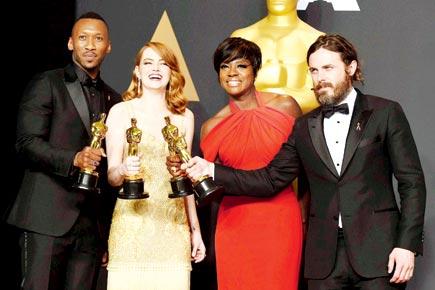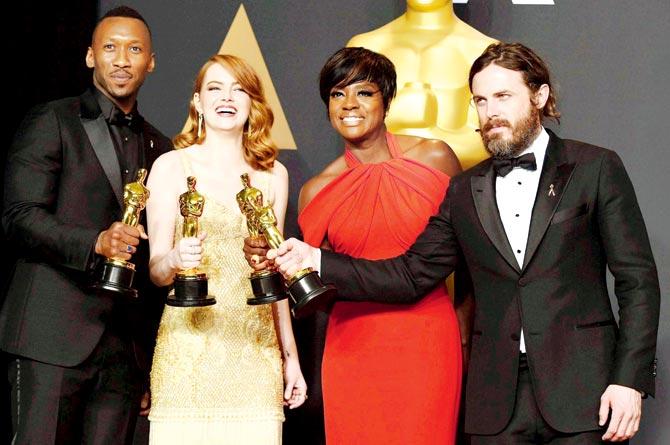How the historic Academy Awards night made us grudgingly admit, Donald Trump notwithstanding, that America is great after all

(From left) Mahershala Ali, winner of best actor in a supporting role, Emma Stone, winner of best actress in a leading role, Viola Davis, winner of best actress in a supporting role, and Casey Affleck, winner of best actor in a leading role. Pic/AFP

(From left) Mahershala Ali, winner of best actor in a supporting role, Emma Stone, winner of best actress in a leading role, Viola Davis, winner of best actress in a supporting role, and Casey Affleck, winner of best actor in a leading role. Pic/AFP
ADVERTISEMENT
No, I didn't boycott the Oscars in 2016. They just didn't invite me. Much like in 2017. I did mentally boycott the protest against it though, as #OscarsSoWhite gained momentum like a social meteor at the Academy Awards last year — because no coloured person had been nominated for best acting/film honours.
This was reverse racism, I felt. Basing film nominations on colour seemed more detrimental to qualitative merit in art, than beneficial to any race. Let's look at race, of another kind, for instance. As is quite likely, what if you only saw black men charging down from all eight tracks of a 100 metres race at the Olympics finals. Would you hashtag, tweet, #OlympicsSoBlack? No.
But the Oscars in '17 were more sensitive than me. They came back fully sprinkling the nomination rows with coloured people in the house. What had changed? As People Magazine editor Jess Cagle pointed out on the red carpet show, the Academy had changed, literally (in terms of members). And there were films of undeniable merit — Hidden Figures, Fences, and Moonlight. So this was, in Cagle's words, "part activism, part coincidence."
The first award itself, with Mahershala Ali, the first Muslim ever to pick up an acting nod at the Oscars, set the tone. Not that I'd ever thought of Oscars in terms of religion, but Iranian Asghar Farhadi picking up best foreign film, while the 'Muslim ban' does not allow him to visit the US, could not possibly have gone any other way, even as the host Jimmy Kimmel announced the show was being watched in America, and "225 countries that now hate us."
No, sir, we were just watching you very closely, bringing in unsuspecting black/coloured tourists to interact with stars on the front-row, interspersing segments with more coloured people talking about their filmic inspirational moments, besides a long, but befitting tribute to the Chinese Jackie Chan, as you lifted Mumbai boy Sunny Pawar on your arms with candies showered at LA's Dolby Theatre.
Just a year ago, when we were legitimately aspiring for a post-racial world, given a half-black man was already the planet's most powerful President, I would've barfed at this apparent over-compensation for an otherwise all-white crowd that Oscars have always been for, and about.
Award winners themselves, for the longest, have followed an arguably crackable formula: 1) Harvey Weinstein should be the film's producer. 2) The film should be a biopic. 3) There should be a British connection. I haven't tallied this year's results, but 2/3 = Oscar-nom at worst; best picture gong, at best. According to research, if you may, more best picture/actor winners, in the Oscars' televised history, have thanked Weinstein than God, on stage. I've hung out with some Hollywood execs, and they're the most insular lot you'll ever meet. The world, according to them, is Hollywood—the former being merely the market that sometimes accounts for 70 per cent of the latter's revenue.
So why was I misty-eyed, as if one of my own had won, when Viola Davis delivered that heart-wrenching speech, calling art the "only profession that celebrates what it means to live a life"? Or when a gratified Barry Jenkins, for Moonlight, exulted, "For the next four years, we will not forget you," referring to the self-admitted bigot, Donald Trump's, presidency.
Maybe the slip-up for Best Picture Oscar between La La Land and Moonlight was a Freudian slip! Even if there's gentle blaxploitation, or a faint hint of hypocrisy among Americans, who voted Trump in, now cheering on their black mates—we will take it, any day, over overt frickin' hatred!
Because the times they are a changin', Mitron! Our concerns are more post-truth. In less than a year, even America looks as if it has turned upside down. Trust the 'sickular', 'libtards' of the Academy to stand against the blowin' wind. At the show, one heard far more of the catchwords "intolerance", "immigration", "racial violence", "gender discrimination", than "films" or "fashion"—although both still held the tent-pole.
Have the Oscars always been about taking a stand? More or less, yes. Which is what prompted a publication (this is an old quiz question), to cry out loud, "Is this the Academy Awards, or the bloody Nobel Peace Prize," referring to the year (1982) that Richard Attenborough's Gandhi, pipped Steven Spielberg's ET to the post! Ang Lee's Crouching Tiger Hidden Dragon (2000) was as much a gentle acknowledgement of China's political ascent as greatness of that particular film. Should film awards be apolitical? From a partisan politics' point of view? Of course. But what does art, however commercial, embody, if not empathy? What is that response to injustice, if not politics?
As emcee and 'anti-national' No. 1 Kimmel live-trolled his President on Twitter from the Oscar stage, and I thought to myself, yup, that's why America is great. Only Gary Kasparov could have put it better (brackets, mine): "There is no weapon or wall that is more powerful for American security than America being (secretly) envied, (openly) imitated, and (grudgingly) admired across the world!"
Mayank Shekhar attempts to make sense of mass culture. He tweets @mayankw14 Send your feedback to mailbag@mid-day.com
 Subscribe today by clicking the link and stay updated with the latest news!" Click here!
Subscribe today by clicking the link and stay updated with the latest news!" Click here!






